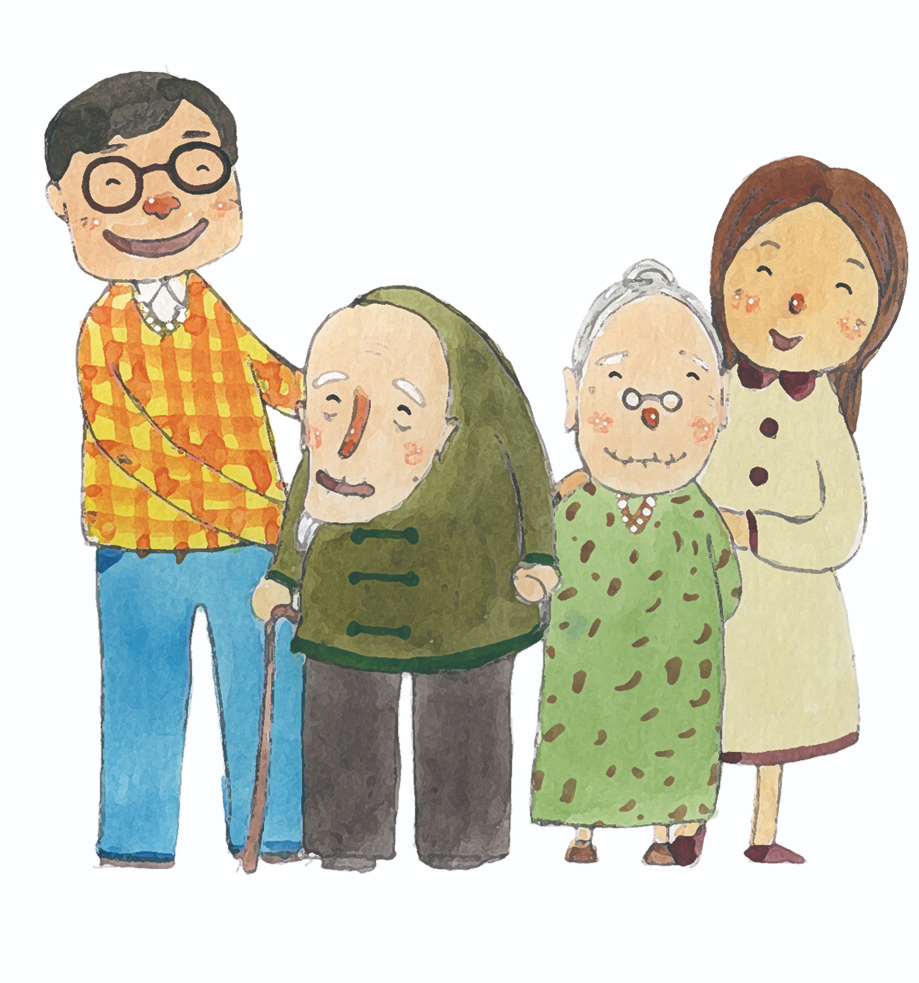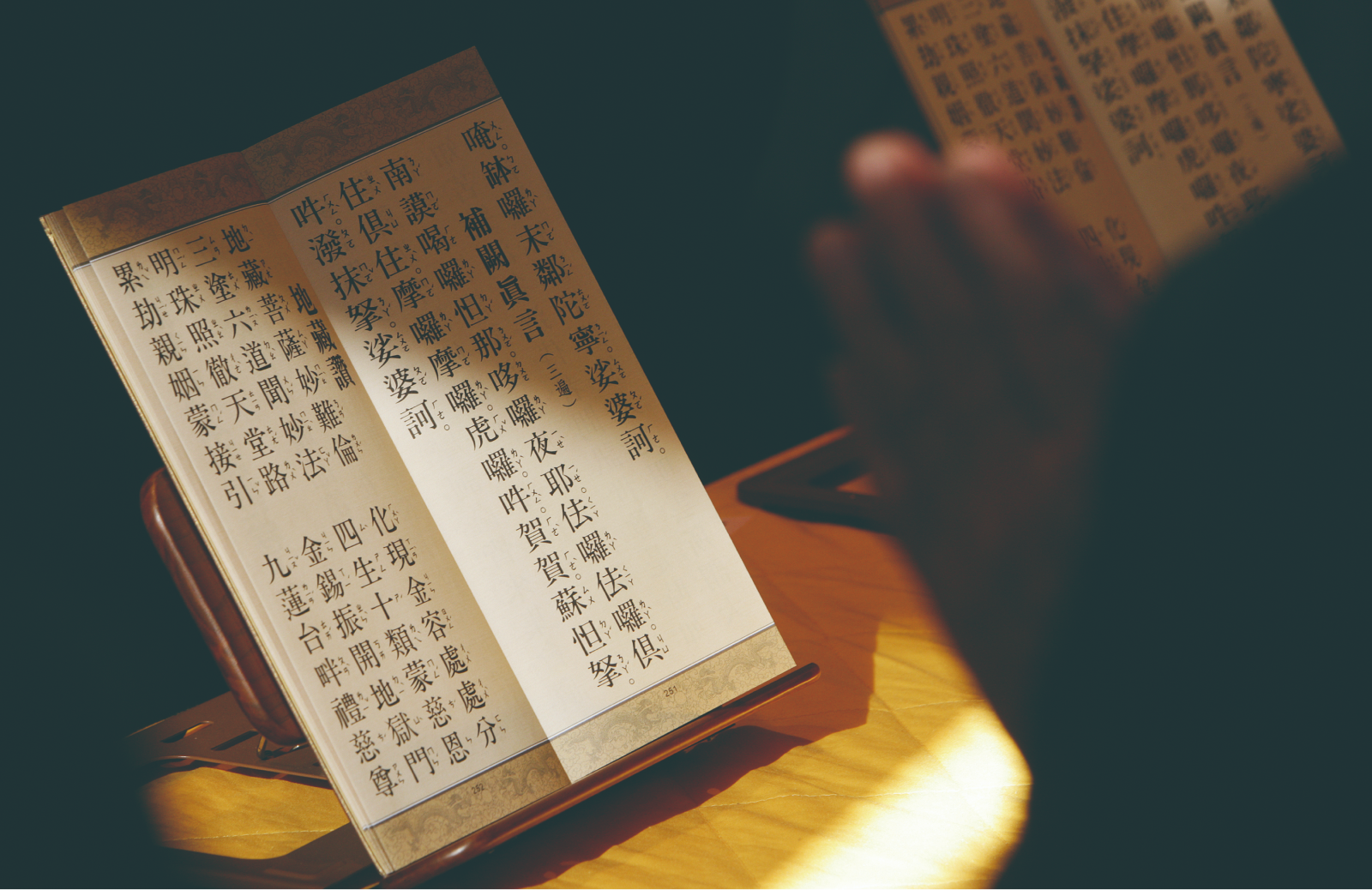Special Topics
The Foundation of Attaining Buddhahood — Altruism
On the path to Buddhahood, who would you choose to liberate first: yourself, or others?Ksitigarbha Bodhisattva was faced with such a choice between the two when, in a past life, he was the king of a small country. He was friends with the king of a neighboring country and, together, they often gave alms to the poor. However, the common people kept committing various evil acts and suffered from all kinds of afflictions and mishaps. One king thus pledged that he would first attain Buddhahood and then return to earth to extensively deliver all sentient beings. The other vowed: "Until I have delivered all the misguided beings from suffering, helped them to live in peace and joy until they attain Bodhi, I shall not attain Buddhahood." The latter was Ksitigarbha Bodhisattva, who thus made the vow: "Only when all sentient beings are delivered, will I attain Bodhi."
"One question that inevitably arises in the process of our spiritual practice is: who should we put first, ourselves or other sentient beings? Oftentimes, we think of ourselves first..." said Ven. Chang Hwa, who used to give Dharma talks at Earth Treasure (Ksitigarbha) Bodhisattva Hall during the Great Compassion Water and Land Dharma Service. The Venerable pointed out that the Buddhas and Bodhisattvas pledge to deliver all beings with vows, whereas ordinary people use vows to seek the path of Buddhahood. However, the Ksitigarbha Sutra reminds us that, to attain Buddhahood, we must first make vows to deliver sentient beings.
"Only when all sentient beings are delivered will I attain Bodhi; I will not attain Buddhahood until the hells are emptied." Ksitigarbha Bodhisattva made this great vow to rescue all suffering beings, allow them to live in peace, and propagate all the benevolent teachings and practices with the power of his vows. Ksitigarbha Bodhisattva demonstrates not only the compassion to deliver all sentient beings, but also the proper attitudes that all Buddhists should develop.
Master Sheng Yen once shared that, wherever he went and whoever he met, he had never thought of gaining anything, nor expected any benefits from the other person. What he usually thought instead was: "What does that person need? What benefits or hopes can I bring to that person?" Master Sheng Yen encouraged us to model ourselves after Ksitigarbha Bodhisattva by being considerate to others in every aspect of our lives. In addition, we should help and enable others to succeed so that we can transform our own delusions into wisdom, as well as turn our vexations into joy.
Filial piety as the initiation into shouldering the enormous responsibility of delivering all sentient beings
 The power of Ksitigarbha Bodhisattva's vow is so profound and extensive that the Buddha has praised it more than once: "[Ksitigarbha Bodhisattva,] your compassion is so unimaginable; your wisdom so unthinkable." What motivated Ksitigarbha Bodhisattva to vow to deliver all beings life after life, time after time, originated from the filial piety he shows while rescuing his mother in past lives.
The power of Ksitigarbha Bodhisattva's vow is so profound and extensive that the Buddha has praised it more than once: "[Ksitigarbha Bodhisattva,] your compassion is so unimaginable; your wisdom so unthinkable." What motivated Ksitigarbha Bodhisattva to vow to deliver all beings life after life, time after time, originated from the filial piety he shows while rescuing his mother in past lives. For the sake of rescuing his mother from hell, Ksitigarbha Bodhisattva made the great vow that states: "From this day, and for trillions of kalpas in the future, I vow to rescue and liberate all the misguided beings from suffering in every world that has hells and the three evil realms, enabling them to leave the realms of hells, lower realms, animals, and hungry ghosts, so that these misguided beings suffering from their karmic retribution can attain Buddhahood. Only then will I attain the supreme enlightenment." In the sutra, Ksitigarbha Bodhisattva also sincerely guided and taught us in every possible way to serve our parents with filial piety, as well as to respect and love them.
"Parental kindness is as massive as a mountain range, which is so huge that we cannot repay even by sumptuous meals; only when the parents have the blessings of renunciation, can the child fulfill their right conduct as offspring." This excerpt from Master Lianchi Zhuhong's (also known as Master Yunqi Zhuhong)"Dissolution in Seven Strokes" of the late Ming Dynasty, in the, states that it is insufficient to repay parents' kindness by giving them a luxurious life. Only through transferring merits to our parents and influencing them by our own spiritual cultivation and aspiration, applying Buddhist concepts to liberate ourselves from the hindrance of vexation, and helping one another pursue the Bodhisattva's path, can we achieve the ultimate great filial piety.
"Confucian filial piety is about the moral conduct of a person, whereas the filial piety revealed in the Ksitigarbha Sutra is about great compassion, which is the virtue of a Buddha." Venerable Chang Hwa pointed out that even though the concept of Buddhist compassion might seem abstract, the filial piety revealed in this sutra can serve as its best interpretation. At the end of the sutra, the Buddha entrusted all beings in the Sahā world to Ksitigarbha Bodhisattva, saying: "In the future, if there is a deity, virtuous man, or virtuous woman who plants a tiny virtuous root in Buddhadharma, even if the root is as trivial as a hair, a speck of dust, a grain of sand, or a droplet of water, you shall use your divine power to support this sentient being to gradually attain Bodhi, and do not let them regress or lose it." It can be seen from the scripture that Ksitigarbha Bodhisattva unconditionally shoulders the arduous responsibility of delivering all sentient beings. Even if it is merely a tiny good thought that arises in our mind, Ksitigarbha Bodhisattva will take care of us until we attain Buddhahood. The Ksitigarbha Bodhisattva delivers foes and friends equally regardless of degree of intimacy, as every sentient being is regarded as both a father and a mother.
The Four Types of Deliverance of Ksitigarbha Bodhisattva
"The Dharma Approach of Ksitigarbha Bodhisattva is specifically focused on preventing people from falling into evil paths." Venerable Yin Shun, in "The Sacred Virtues and Dharma Approach of Ksitigarbha Bodhisattva", categorizes the power of Ksitigarbha Bodhisattva's aspiration into four types of deliverance: the eternal deliverance, the deliverance before death, the deliverance after death, and the deliverance for those who have fallen into the evil realms.
 For example, the deliverance before death is stated in the scripture as: "the family members of the dying person should do virtuous deeds... such as reciting the sutra, making offerings to the statues or various holy representations of Buddhas and Bodhisattvas, and reciting the name of Buddhas, Bodhisattvas and Pratyekabuddhas (solitary Buddha) so that the names can be heard by the dying person." The deliverance after death can take effect within forty-nine days of the person's death through doing virtuous deeds, performing acts of giving, reciting Buddhas' name, and then transferring the merit to the deceased to keep the person away from suffering in the three evil realms, thereby letting them reincarnate in the realms of human beings or gods. For the bedridden person who is about to pass away, the family members can recite the Ksitigarbha Sutra, or donate the patient's most treasured possessions so that the person can reduce their attachment as well as cultivate blessings and merit.
For example, the deliverance before death is stated in the scripture as: "the family members of the dying person should do virtuous deeds... such as reciting the sutra, making offerings to the statues or various holy representations of Buddhas and Bodhisattvas, and reciting the name of Buddhas, Bodhisattvas and Pratyekabuddhas (solitary Buddha) so that the names can be heard by the dying person." The deliverance after death can take effect within forty-nine days of the person's death through doing virtuous deeds, performing acts of giving, reciting Buddhas' name, and then transferring the merit to the deceased to keep the person away from suffering in the three evil realms, thereby letting them reincarnate in the realms of human beings or gods. For the bedridden person who is about to pass away, the family members can recite the Ksitigarbha Sutra, or donate the patient's most treasured possessions so that the person can reduce their attachment as well as cultivate blessings and merit. The main deliverance methods mentioned in the sutra include the action of giving, setting up offerings, chanting Buddhist scriptures, and reciting Buddhas' name in front of the Three Jewels. Though these actions may seem easy, they can still bring unimaginable merit, as the sutra states: "Now and in the future, if a dying being hears the name of a Buddha, a Bodhisattva, or a Pratyekabuddha on the day of their passing, they will be delivered regardless of whether they had committed sins or not."
Moreover, the sutra contains detailed depictions of the sentient beings' physical and mental states at each phase of their life before their passing, such as the bedridden ones who can "neither recover nor have a quick death" under the torment of long illness. Another example depicted is the dying "whose mental state is clouded, and are unable to distinguish between good and evil, even losing sight and hearing". In another passage, we learn, "In the first forty-nine days after their deaths, their consciousness is dull as if they are in deafness... in every thought, they are hoping that their family members can help to liberate them with the power of merit gained from virtuous deeds."
As for the deliverance for those who have fallen into evil realms, Ksitigarbha Bodhisattva appears and delivers teachings in his emanations of the Brahmin girl and the bright-eye daughter on how to help their mothers escape from hells through the merit gained from giving, reciting Buddhas' names, and, ultimately, making the great compassionate vow. His great vow is the source of Ksitigarbha Bodhisattva's eternal deliverance: namely "Throughout the countless kalpas to come, I shall extensively deliver all the misguided sentient beings from suffering in the six realms by designing every possible expedient means; only then, will I attain Buddhahood"
The Spiritual Cultivation that Benefits Both the Living and the Dead
With the power of his great compassionate vows, Ksitigarbha Bodhisattva has developed such convenient approaches to deliverance in Sahā world, which not only helps the deceased from falling into evil realms, but also soothes the unsettled hearts of the living. Therefore, in the Sutra on the Divination of the Effect of Good and Evil Actions, the Buddha proclaimed Ksitigarbha Bodhisattva as "the one who is adept at giving soothing Dharma talks."
However, the most effective deliverance comes from one's own spiritual practice while still alive. As stated in the sutra: "If one's family members practice virtuous deeds to gain merit for the deceased after their passing, the deceased can have one-seventh of all the merit, while the six-sevenths of the remaining merit will benefit the living themselves." It might be demoralizing to learn that the deceased can only have one-seventh of the merit gained from their family members' virtuous deeds. However, Ksitigarbha Bodhisattva encouraged us to raise our yearnings for Dharma, as well as be diligent in our Buddhist learning and practices to transform our affectionate attachment to the deceased family and friends into a more profound force for practice and blessings.
Reap What You Sow
We have been sowing all kinds of karmic seeds in the field of our eighth consciousness since countless kalpas. The karmic seeds lead to karmic retribution, thereby leaving us wandering between life and death. How do we liberate ourselves from this cycle? As the saying goes: "Bodhisattvas dread the causes, while mundane beings dread retribution." Most sentient beings do not regret their misconduct until they personally experience the bitter taste of karmic retribution for themselves. Therefore, Ksitigarbha Bodhisattva specifically gave a detailed account of the causes for each occurrence of karmic retribution:
 "When encountering those who kill, tell them about the karmic retribution of shortened life span; for those who steal, explain the karmic retribution of poverty and distress; when meeting those who commit adultery and sexual misconduct, let them know the karmic retribution of rebirth as sparrows, pigeons and ducks; for the foul-mouthed, explain the karmic retribution of family infighting; when meeting those who slander, tell them about the karmic retribution of being tongueless and having mouth sores; for those who are vengeful, explain the karmic retribution of being ugly and crippled with deformities; when encountering those who are miserly, tell them about the karmic retribution of having nothing going as they wish..."
"When encountering those who kill, tell them about the karmic retribution of shortened life span; for those who steal, explain the karmic retribution of poverty and distress; when meeting those who commit adultery and sexual misconduct, let them know the karmic retribution of rebirth as sparrows, pigeons and ducks; for the foul-mouthed, explain the karmic retribution of family infighting; when meeting those who slander, tell them about the karmic retribution of being tongueless and having mouth sores; for those who are vengeful, explain the karmic retribution of being ugly and crippled with deformities; when encountering those who are miserly, tell them about the karmic retribution of having nothing going as they wish..."We reap what we have sown. Ksitigarbha Bodhisattva guides us to realize that all the karmic retribution results from our thoughts and intention. That is, our current living conditions in addition to all the ups and downs in our lives, stem from our past actions. Once we understand the principle of karmic cycle across three lifetimes (past, present, and future lives) and the dependent origination of karma, we are able to calmly accept many phenomena in our lives without grievance or complacency.
Earnestly cultivating our spiritual practice
"Our minds contain infinite treasures. It all depends on how we realize its potential." Elderly Ven. Meng Tsan, who had long been lecturing on the Ksitigarbha Sutra by comparing our mind to the earth, likened our thoughts and intentions to the flowers and fruits that naturally blossom and bear on trees. That is, the fruits of our behavior are in accordance with the thoughts that arise in our mind.
As mentioned in the chapter of Comparing the Merit of Giving, by performing the same act of giving, the merits for kings, for people of Brahmin caste, and for us are different. The purpose for the Buddha to impart the merits of giving is not to compare how much merit we can gain from them, but for us to examine what kind of intention we have while giving. Likewise, in our daily lives, with what thoughts and intentions do we live our lives, work, and cultivate our spirituality?
"One of the key points of the Ksitigarbha Sutra is that it solves not only the problems of this life but also those in infinite future lives to come." Ven. Kuan Cian, the head of the Chue Feng Buddhist Art Foundation, shared that should we keep creating karma on the basis of the results that have ripened in this present life without developing the Bodhi mind of "seeking Buddhahood while delivering all sentient beings," we would merely be drifting aimlessly between the cycles of life and death.
From the perspective of Buddhism, it appears that, in this life,we can do little about the karma that we caused in past lives. However, every thought arising in our mind at the present moment can form the basis for transforming our lives. Therefore, Elderly Ven. Meng Tsan encouraged people to recite the Ksitigarbha Sutra every day, so that we can take the sutra as a mirror through which we can examine whether our own speech and behaviors — and even our thoughts and intentions — go against the teachings of the Buddha, as well as any improvements to be made. When violations and mistakes occur, we should promptly change ourselves for the better, and follow the teachings and practices as taught in the scriptures.
Related articles:
Buddhist Scripture of Filial Piety: Ksitigarbha Sutra
A Basic Introduction to the Ksitigarbha Sutra
The Foundation of Attaining Buddhahood — Altruism
Practicing Ksitigarbha Bodhisattva's Method
Common Questions on the Practice of Ksitigarbha Sutra
Resource: Issue 372 of Humanity Magazine, Dharma Drum Publishing Corporation
Translation: Sinag-ling Li (李祥苓)
Editing: Keith Brown, 可馨
